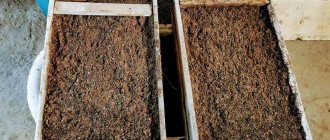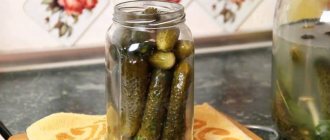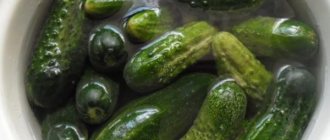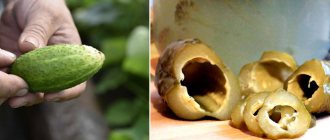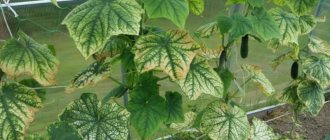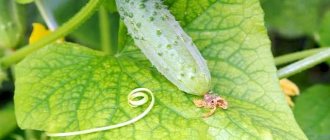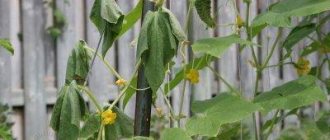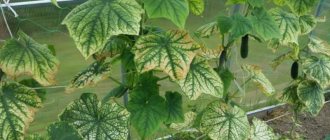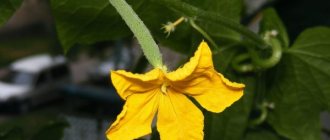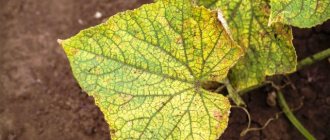Is it possible to preserve bitter cucumbers?
The bitterness in cucumbers is caused by the substance cucurbitacin. During heat treatment, it splits, and with it the unpleasant aftertaste goes away. Therefore, bitter cucumbers are not only possible, but also necessary to preserve. They acquire exactly the same taste as regular fruits. So this is the surest, and sometimes the only way to somehow preserve the harvest.
Reference . Despite its taste characteristics, cucurbitacin is considered beneficial for the human body. It has antimicrobial, anti-inflammatory and antitumor effects. Therefore, nothing bad will happen if you eat a couple of bitter cucumbers.
Why are cucumbers bitter?
The bitter taste in cucumbers is caused by an increased content of cucurbitacin, one of the glycosides produced by plants of the Cucurbitaceae family.
Cucurbitacin and its significance
This substance serves as protection against insects, increases resistance to adverse conditions, and improves seed germination.
Cucurbitacin is synthesized in the leaves and distributed throughout the plant. Its amount is especially high in the roots. In fruits, the glycoside accumulates at the base and in the peel.
This is interesting! Studies are being conducted on the antitumor activity of cucurbitacin. Scientists consider the substance promising in the fight against cancer.
In small doses, cucurbitacin is always present in plant tissues, and this does not affect the taste of the vegetable. But under unfavorable conditions, cucumbers produce it in increased quantities and become bitter.
Factors leading to bitterness
Cucumbers begin to taste bitter when the weather is unfavorable or care is not taken care of properly.
Reasons for the unpleasant taste of fruits:
- untimely and insufficient watering;
- cold water irrigation;
- excess sun;
- sudden changes in day and night temperatures;
- thickened plantings;
- lack of nutrients;
- damage by diseases and pests;
- planting varieties predisposed to bitterness (these include varieties of old selection - Muromsky, Vyaznikovsky).
Recipes for bitter cucumber twists
Bitter fruits are preserved in the same way as regular ones. But there are a couple of nuances. Before proceeding directly to preparation, the cucumbers must be thoroughly washed and soaked for 8 hours in ice water. It is advisable to change the water every 2 hours to keep it cold. Here are examples of step-by-step recipes.
In a spicy marinade
The cucumbers according to this recipe are very sharp and crispy. You will need a three-liter jar.
Ingredients:
- 2 kg of cucumbers;
- 6 cloves of garlic;
- 30 black peppercorns;
- 3 pods of red hot pepper;
- 1 horseradish leaf;
- 3 blackcurrant leaves;
- 2 bay leaves;
- 10 coriander seeds;
- 1 sprig of tarragon;
- 1 sprig of basil;
- 3 tbsp. l. vodka;
- 1.3 liters of water;
- 75 g salt;
- 150 g sugar;
- 120 ml 9% vinegar.
Preparation:
- Wash all leaves and greens. Peel the garlic.
- Remove seeds from hot peppers.
- After 8 hours of soaking, remove the cucumbers and trim the ends.
- Place in a large colander and pour over boiling water.
- Immediately after this, pour ice water again for 2 minutes.
- Place half of all the herbs, garlic, pepper and spices on the bottom of the jar.
- Next, pack the cucumbers tightly.
- Place the other half of the spices and herbs on top.
- Boil water in a saucepan.
- Add salt and sugar to it. Cook until completely dissolved.
- Fill the jar with brine.
- Pour vinegar and vodka on top.
- Cover the jar with a lid and place in a large saucepan to sterilize.
- Boil the cucumbers in a jar for about an hour.
- Roll up.
In tomato sauce
The recipe is for 10 liters of finished product. Tomato sauce is suitable both classic and with additives.
Ingredients:
- 5 kg of cucumbers;
- 200 ml tomato sauce;
- 1.5 liters of water;
- 100 ml 9% vinegar;
- 50 ml vegetable oil;
- 100 g sand;
- 250 g onions;
- 8 cloves of garlic;
- 60 g salt;
- 5 black peppercorns;
- 5 peas of allspice;
- Bay leaf;
- dill umbrellas.
Preparation:
- Peel the onion and cut into rings.
- Grind the garlic into a paste.
- Place dill, bay leaf and garlic pulp at the bottom of the jars.
- Then place the cucumbers tightly.
- Place onion rings on top.
- Mix water, sugar and salt in a saucepan. Bring to a boil and cook until the crystals are completely dissolved.
- Finally add vinegar.
- Pour the marinade into the jars, cover with lids and place in a large container with water.
- Bring water to a boil and sterilize jars for 15 or 45 minutes, depending on the volume of containers used.
- Remove the jars, close and cool.
Spiced
You will need 12 liter jars or 4 three-liter jars.
Ingredients:
- 10 kg of cucumbers;
- 500 g sugar;
- 400 g salt;
- 250 g dill;
- 20 g mustard seeds;
- 15 g tarragon greens;
- 10 cloves of garlic;
- 10 peas of allspice;
- 15 g grated horseradish root;
- 1.4 l 9% vinegar;
- 8 liters of water.
How to remove bitterness before preservation
If you want to preserve cucumbers without preliminary long-term heat treatment, for example, by pickling them, then you should play it safe and take measures to get rid of bitterness.
Here are some ways:
- Soaking in a salty solution can partially remove the unpleasant taste. It is advisable to cut the fruit lengthwise and cut off the bases that attach the cucumbers to the stem.
- Soak overnight in cold water. Less effective than saline solution.
- Cucurbitacin accumulates in the highest concentration at the base of the fetus. Therefore, cutting off this part and rubbing the cut area helps. During this procedure, cucurbitacin will be released from the pulp in the form of a slight foam. After rubbing, rinse the fruits.
- For maximum effect, it is better to use all methods in turn. First, soak whole fruits in cold water, then carry out the rubbing procedure and finally pour in saline solution.
Where to use fresh bitter cucumbers
To be able to consume bitter cucumbers fresh, it is also advisable to soak them in water or a salty solution.
Important . Keep in mind that when soaked with salt, the fruits will acquire a corresponding salty taste.
Then you should remove the ends. The main thing is to cut off the dark green base. It has the greatest bitterness. It is also worth completely peeling the cucumbers. There is a high probability that this will completely remove the unpleasant taste.
Vinegar also has the effect of reducing the perceived bitterness. Therefore, you can prepare this salad from fresh bitter fruits: salt grated cucumbers, add ground black pepper, lemon juice, green onions and season with vinegar mixed with vegetable oil.
How to Prevent Bitterness When Growing
Cucurbitacin begins to be produced by the vegetable in stressful situations. These include:
- lack or excess of moisture;
- constant exposure to direct sunlight;
- lack of nitrogen and potassium fertilizing;
- watering with too cold water;
- seedling diseases;
- dense planting;
- night frosts.
In order for the harvest to be tasty, it is necessary to provide the plants with proper care: regularly water and fertilize, protect from the hot sun and weed.
The most resistant varieties of cucumbers that can withstand unfavorable conditions and do not change the taste: Ant, April, Zyatek, Ginga, Kuznechik, Masha, Gerasim, Maryina Roshcha, Kurazh, Egoza, Chistye Prudy, etc.
Unresistant varieties: Vyaznikovsky, Muromsky and Nezhinsky.
Is there a difference between the causes of bitterness in cucumbers?
In the greenhouse
Varieties of cucumbers that are intended for growing in greenhouses are quite whimsical. Often, summer residents install greenhouses in a place where the sun scorches all day. And this is a mistake, because these plants do not tolerate an abundance of sunlight and heat. And if there are temperature fluctuations from a hot day to the coolness of the night, then the cucumber plantings experience severe stress, due to which the fruits become bitter.
The most common causes of bitterness in cucumbers grown in greenhouses include:
- the small area of the greenhouse, due to which the plants are not able to grow freely, and the lashes are tangled and damaged;
- too much penetration of sunlight through the walls of the greenhouse;
- ventilation of the greenhouse with a large difference in temperature and humidity outside and inside;
- insufficient humidity in the greenhouse;
- inappropriate temperature conditions during different periods of plant growth. During active growth, the temperature in the dark should not exceed 18°, and in the light 20°. When the plant is in the fruiting stage, the temperature should not fall below 28°.
- infertile soil with a poor content of necessary substances (phosphorus and nitrogen must be present).
In a garden bed in open ground
The bitter taste in cucumbers grown in open ground appears for the same reasons as in a greenhouse, but several more factors are added:
- more sunlight than in a greenhouse;
- rare watering or irrigation with cold water;
- sudden temperature changes in open conditions;
- planting in low-lying beds that do not warm up well and are subject to temperature fluctuations;
- planting cucumbers near raspberry or blackberry bushes, which take all the nutrients from the soil along with water.
Tips and tricks
To make the cucumbers crispy and the rolls to last a long time, use these recommendations:
- Before canning, prepare containers for storage: thoroughly wash jars with lids and sterilize them in any way convenient for you (in the oven, in the microwave, over steam or in boiling water).
- Use coarse salt, it reduces the risk of jars exploding.
- It is better to close the jars with a special sealing machine. This will ensure the best seal, especially if you are new to this business.
- To roll bitter cucumbers, it is necessary to carry out heat treatment before or after placing them in a jar. This will remove the unpleasant taste.
- To prepare lightly salted cucumbers, you will need to remove the skin, again, to remove the bitterness.
Let's sum it up
Don't despair if your cucumbers are bitter. Of course, you won’t be able to eat them fresh without adding vinegar or spices, but you can preserve the bitter fruits for the winter. After undergoing soaking and heat treatment, they taste exactly the same as regular cucumbers.
It has been noticed that if sunny, hot weather lasts more than 5 days, then the number of bitter cucumbers doubles. But there are other reasons for the appearance of bitterness - for example, uneven watering or improper feeding.
We’ll tell you in the article how to correct the taste of the fruit and whether and how to preserve cucumbers with bitterness.
Is it possible to get rid of bitterness or reduce it?
Cucumbers with bitterness are quite suitable for fresh use and for preservation.
How to remove bitterness from cucumbers
Bitter cucurbitacin is soluble in water, excreted in juice and concentrated mainly in the peel of the fruit. Therefore, there are several ways to remove bitterness.
Cut off the peel
Before preparing the salad, taste the cucumbers. If you feel an unpleasant bitterness, peel the fruit and use it for its intended purpose.
Removing bitterness by rubbing
Do you want to save your vitamins? Then try another way.
Trim off the ends and cut the fruit lengthwise. Rub the cuts of both halves against each other until the white foam stops coming out, then rinse the pieces under running water.
Recipe with salt
Cut the cucumber into small pieces and sprinkle with salt. Leave for about 30 minutes. The bitterness will go away along with the released juice. Rinse the slices in water and prepare the salad.
On a note! Salt the bitter cucumbers. There is absolutely no unpleasant aftertaste in this snack.
Features of storing workpieces
Jars with winter preparations of pickled cucumbers are best stored in a cool room - a pantry, cellar, or at least on a glassed-in loggia.
If you follow all the conditions for proper preservation (sterilization of jars, careful selection of fruits for pickling, etc.), then even in room conditions your preparations will not be in any danger.
Important! An open jar of cucumbers should not be stored for longer than one or two weeks. As a last resort, the remaining specimens can be frozen and used for cooking.
What to do when pickling
The best way to remove bitterness from large quantities of vegetables intended for pickling is to soak them in water:
- Wash the cucumbers thoroughly.
- In a suitable container, fill the fruits with cold water.
- Once every 3 hours, drain the water and add fresh water.
- After 6-7 hours, try the cucumbers. If you like the taste, start canning.
- If the bitterness remains, change the water 2-3 more times.
If it was not possible to completely rid the vegetables of bitterness, you can marinate them with spices. This will add flavor to the canned vegetables and mask any remaining bitterness.
Spicy cucumbers
For 1 kg of cucumbers you need:
- water - 1.5 l;
- sugar - 2 tbsp. l.;
- salt - 3 tbsp. l.;
- 9% table vinegar - 100 ml;
- red onion - 1 pc.;
- black peppercorns - 10 pcs.;
- green bell pepper - 1 pc.;
- garlic - 2 cloves;
- horseradish leaves - 2 pcs.;
- black currant leaves - 5 pcs.;
- dill umbrellas - 3 pcs.;
- bay leaf - to taste.
Cooking method:
- Cut off the ends of washed cucumbers.
- Peel the sweet pepper from seeds and finely chop.
- Cut the garlic into rings and the onion into half rings.
- Place washed leaves and dill on the bottom of the jar.
- Place the cucumbers tightly and add chopped peppers, onions and garlic.
- Boil water, pour cucumbers into a jar and leave for 5 minutes.
- Drain the water into the prepared pan, add black pepper, salt, sugar and vinegar.
- Boil the marinade and fill the jars to the top, roll up the lids, turn them over and cover with a blanket until they cool.
Spicy cucumbers
For 1 kg of fruit you need:
- water - 1.5 l;
- sugar - 5 tbsp. l.;
- salt - 3 tbsp. l.;
- 9% table vinegar - 100 ml;
- allspice peas - 4 pcs.;
- hot pepper - 0.5 pods;
- mustard seeds - 0.5 tsp;
- garlic - 2 cloves;
- black currant leaves - 5 pcs.;
- bay leaf - 2 pcs.
Cooking method:
- Cut off the ends of washed cucumbers.
- Finely chop the garlic and hot pepper.
- Place washed leaves, mustard, allspice, chopped garlic and hot pepper on the bottom of the jar.
- Pack the cucumbers tightly.
- Boil water, pour cucumbers into a jar and leave for 20 minutes.
- Drain the water into a saucepan, add salt and sugar.
- Boil the marinade and pour over the vegetables, pour vinegar on top.
- Roll up the lids, turn them over and cover with a blanket until cool.
Does the bitterness go away from cucumbers when preserved?
When exposed to high temperatures, cucurbitacin is destroyed. Marinating or salting in hot brine removes the bitterness from cucumbers.
Selection and preparation of ingredients
Cucumbers for pickling should be approximately the same size (7–12 cm). For pickling, medium-sized fruits up to 9 cm, which still have tender, watery seeds, are suitable. The color should be dark green, without yellow spots.
Thin-skinned vegetables are ideal for winter preparations. Cucumbers with bitterness can be completely skinned if necessary.
Important! If the cucumbers are a little limp, don't worry: soaking the bitterness will replenish them with moisture and make them springy again.
Recipe No. 1
easily
How to grow a sweet cucumber without bitterness
Provide the plants with comfortable conditions, and they will thank you with an abundance of sweet, aromatic fruits.
Preventing bitterness
Several recommendations will help you grow delicious cucumbers in your garden:
- plant plants in loose, fertile soil;
- do not thicken the plantings, the optimal scheme is no more than 4 bushes per 1 m2;
- bright sunlight is contraindicated for cucumbers; in a glass greenhouse, white the windows with chalk, cover the film with colored non-woven material; in open ground, natural shading will be provided by planting next to corn or sunflowers;
- water the cucumbers only with warm water;
- do not allow the soil to dry out to a depth of more than 5 cm;
- do not get carried away with nitrogen fertilizers; it is enough to apply 3 fertilizings per season - a week after planting seedlings or emergence of seedlings, during flowering and when ovaries appear en masse;
- the optimal temperature for cucumbers is up to 27 ºС during the day and 18-20 ºС at night;
- Harvest regularly - if there are old cucumbers on the bush, the ovaries slow down their growth, which contributes to the accumulation of cucurbitacin;
- choose hybrids that are not prone to bitterness.
Which cucumber hybrids are not bitter?
Breeders are working tirelessly to improve the properties of plants, and gardeners now have access to cucumber hybrids that are resistant to unfavorable conditions and do not have bitterness in the fruit.
It is worth paying attention to the following crops:
- hybrid Gerasim F1 for salad and canning purposes;
- early hybrid Garlyanda F1 that does not require pollination;
- productive early maturing hybrid Doc F1;
- Egoza F1 hybrid for universal use;
- hybrid for open ground Masha F1.
Varieties of cucumbers that do not taste bitter
The content of cucurbitacin in fruits may differ in different varieties. It is believed that the more pronounced the taste in cucumbers, the more this substance it contains. The least amount of cucurbitacin is found in hybrid or.
The fruits of such plants are usually not bitter. Therefore, when using them, there will be no problem with how to remove bitterness from cucumbers.
In addition, the ovary appears better on them, this is especially true in greenhouses where there are no pollinating insects.
Therefore, to obtain a large and high-quality harvest, it is advisable to grow varieties marked F1, from the fruits of which it will always be possible to prepare a delicious salad without unnecessary manipulation.
These varieties include: Gerasim F1, Garlyanda F1, Doka F1, Egoza F1, Mumu F1, Round Dance F1, Liliput F1, Zabiyaka F1 and many others.
Sometimes manufacturers immediately place information on the packaging stating that this variety of cucumbers is without bitterness.
So, to prevent cucumbers from becoming bitter, you need to use mainly hybrid varieties, and when using ordinary varieties, provide them with sufficient watering with warm water and plenty of nutrition.
Fresh, lightly salted and pickled - cucumbers are good in any form! Cucumber is one of the most popular vegetables. It is loved not only for its taste and range of nutrients and vitamins, but also for its ease of cultivation.
Cucumbers are one of the most unpretentious vegetable crops, and they are also one of the first to ripen in the garden. It would seem that this vegetable has no drawbacks, but this is not so. The “fly in the ointment” is the bitterness that is felt when biting into a fresh cucumber.
Many housewives are racking their brains over how to remove the bitterness from cucumbers before cutting salad or packing jars of preserves.
How to protect cucumbers from bitterness
Measures that can protect cucumbers from bitterness when pickling are as follows:
- When choosing cucumbers for pickling, you should avoid fruits that are overripe, yellowed, or simply large. You should also put aside cucumbers that are smooth, suitable only for salads, crooked, or have skin defects. And select young pimply cucumbers, just picked from the garden and having a length of no more than 15 cm.
- Before pickling, you need to place the cucumbers in cold water for half an hour to an hour, and if the cucumbers are not your own, but purchased, then keep them in water for 5-6 hours. As a result: elasticity will be restored, nitrates will be washed out, and bitterness will disappear.
- For pickling, use non-iodized, non-Extra, non-fine powdered salt. Only exceptionally coarse rock salt.
If you follow these rules, your pickles will never taste bitter.
Preventing Bitterness
For those who buy cucumbers at the market or in a store, it is enough to know how to remove the bitterness from the juicy fruit. However, if you are a vegetable gardener, it is important to know how to grow a healthy, sweet cucumber.
Basic rules for growing delicious cucumbers without bitterness:
Water your bushes regularly
Use warm water for watering. Since the plants are watered in the evening, the water in the hose heats up on its own. To check if the plants have enough water, you need to dig the soil in the garden bed. It should be moistened by at least 15 cm.
Add fertilizer to the soil
Cucumbers love potassium nitrate and nitrogen. The deficiency of a particular mineral can be determined by the state of the plant. Leaves begin to curl or change color. It is better not to add manure and humus to the soil.
Particular attention should be paid to the choice of seeds
They should only be purchased from trusted places. At your request, a consultant at a seed store will advise you and help you choose a “sweet” variety. Most modern varieties contain a special gene. It prevents the accumulation of cucurbitacin in the fetus.
Growing cucumbers is a simple process, but it requires knowledge and compliance with certain rules. If you are ready to follow the recommendations of experienced gardeners, sweet, juicy cucumbers will appear on your table.
Canned cucumbers are one of the popular winter preparations, which can be prepared in a variety of ways. Spicy, sweet, sour fruits will be an ideal addition to main courses. But what to do if the harvested crop is bitter? Is it possible to preserve bitter cucumbers?
